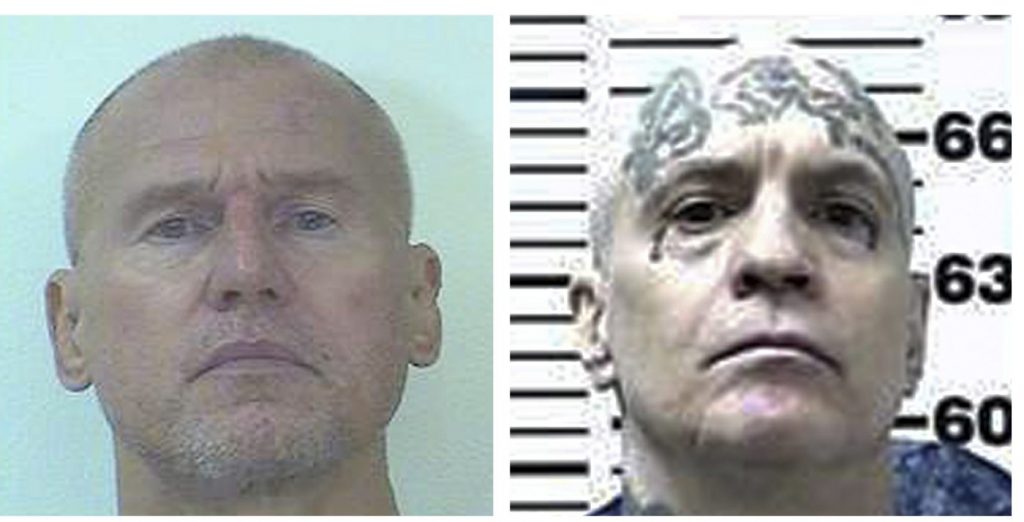SACRAMENTO — Three members of the Aryan Brotherhood have been found guilty of operating a criminal organization, following a lengthy trial that exposed secrets on both sides of the law.
Ronald “Renegade” Yandell, Danny Troxell and William Sylvester were convicted of federal charges related to their leadership roles in the all-white prison gang. All three were convicted of conspiracy to commit murder and racketeering, while Yandell was also convicted of involvement in drug distribution, and joining Sylvester in plots to smuggle contraband into prison.
The charges all carry a sentence of life in federal prison. Though all three defendants are serving life in the state prison system, the Bureau of Prisons will likely house them in maximum security facilities that authorities expect will limit their ability to to obtain contraband phones and continue to run the gang.
Yandell’s defense was two-pronged; his lawyers accused prison officials and federal authorities of retaliating against him for his political activism while behind bars, which included work on a massive prisoner-led hunger strike to end solitary confinement. He also blamed a deceased dropout gang member, Gary Littrell, for ordering the murder of a former San Quentin Six member who’d been a target of prison gangs for years.
Sylvester’s lawyer argued that when Sylvester and another man fatally stabbed a fellow inmate at California State Prison, Sacramento, it was motivated by his dislike of a “known child molester,” not a gang-related reason as prosecutors contend.
Troxell’s lawyer painted his client as a peacemaker who used his influential status to call off murders, not order them. This led to a tense outburst between his lawyer and Yandell, as well as a bus ride back to prison where the two allegedly slung death threats back and forth.
The trial lasted nearly three months, and provided a top-to-bottom overview of the inner workings of the Aryan Brotherhood, a gang that prosecutors say controls the majority of white inmates in California prisons, as well as having a hand in various efforts to traffic methamphetamine and heroin on the outside. The evidence included the defendants own words, recorded during a two-month wiretap operation led by the Drug Enforcement Administration.
Jurors were shown bags of drugs, allowed to hold inmate-made knives that were used to kill people, and sat just a few feet away from self-admitted murderers during the trial, which started in early February. At its end, Chief U.S. District Judge Kimberly Mueller thanked them for their service.
The wide range of witnesses included low-level former prisoners who acted as drug couriers, as well as the head of California prisons, Jeffrey Macomber, who testified as a subpoenaed defense witness about warnings authorities received before a Black Guerrilla Family member named Hugo “Yogi” Pinell was murdered by two Aryan Brotherhood members who earned their way into the gang by committing the prison stabbing.
Pinell’s murder — by far the most controversial — was wrought with suspicious circumstances. Prison officials, including Macomber, testified they were warned several times that placing him on a general population yard would lead to his murder, which turned out to be right. They hedged this revelation by also saying they were given conflicting information at the time, while also admitting Pinell’s history of violence against prison guards and erratic behavior kept him out of favor with both corrections officers and prisoners.
Jurors also heard from former gang members who were charged as co-defendants, like the co-founder of an Orange County-based skinhead gang known as Public Enemy Number One, or PENI, to a heroin dealer and former Aryan Brotherhood member who testified that he made fist fulls of cash for years from his prison cell, through using contraband cellphones to direct drug deals on the outside.
The case started with an undercover DEA investigation into Vallejo-based heroin dealers in the Family Affiliated Irish Mafia, or FAIM, which included purchases from a co-defendant named Jeanna Quesenberry, who has already pleaded guilty. Quesenberry never testified for the prosecution, despite a prediction by Yandell’s lawyers that she would.
The verdict comes almost two weeks after Yandell’s defense team revealed they’d found an email written by the DEA case agent, Brian Nehring, which referenced Yandell’s role as an uncharged co-conspirator in a famous RICO case involving the Aryan Brotherhood, then his involvement in the prison hunger strike, and added, “I want to crush him so bad my teeth hurt.” That became their leading piece of evidence in a motion to dismiss the case for “vindictive prosecution.”
Weeks before the trial’s start, three other co-defendants — Jason Corbett, Patrick “Big Pat” Brady, and Brant “Two Scoops” Daniel — all pleaded guilty to prison murders with the exception that they’d receive sentences of life in prison. But this seemingly smooth process has already his a snag; Daniel’s defense team now says that Bureau of Prisons is refusing to accept Daniel, raising question of whether any of these men will actually end up serving a day in federal prison. They all initially faced a potential death penalty until prosecutors agreed not to seek it.


